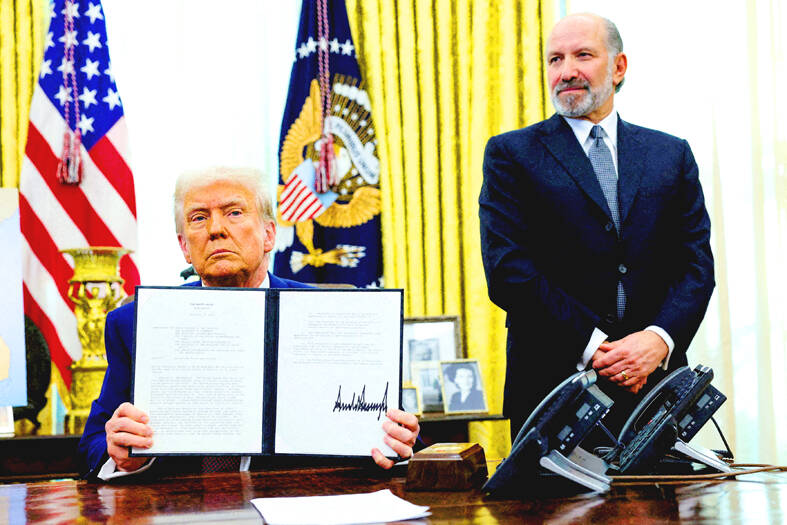US President Donald Trump was to unveil sweeping new “Liberation Day” tariffs after press time last night, but kept the world guessing until the last minute about the scope of an onslaught that could spark a global trade war.
While Trump insisted he had decided on the reciprocal tariffs hitting countries that have targeted the US, the White House said that he was still ironing out the details with less than 24 hours to go.
Early yesterday morning Trump posted a simple one-liner in all caps on his Truth Social network: “It’s Liberation Day in America!”

Photo: Reuters
The Republican billionaire has had a long love affair with tariffs, insisting in the face of economic experts that they are a cure-all that would tackle the US’ trade imbalances.
Critics say that not only would US consumers bear the brunt as importers pass on the cost, but that they could increase the risk of a damaging recession in the US and abroad.
Global markets have been jittery for days ahead of Trump’s announcement, while the countries most likely in the crosshairs have called for talks — even as they ready retaliatory measures.
The move also underscores the growing and profound gulf between Trump’s US and many of its closest allies, not only on trade, but on security, defense and almost everything else.
The 78-year-old US president has trailed the measures for weeks, initially suggesting that the tariffs would simply match whatever levies other countries impose. On Monday, he merely said that he would be “very kind” — but gave little away.
As the deadline drew near, US media reported that he had also been considering blanket 20 percent tariffs — and then that he was looking at a third option where some countries would get preferential treatment.
White House press secretary Karoline Leavitt said Trump was meeting his top advisers on the eve of the announcement, “perfecting it to make sure this is a perfect deal.”
The tariffs would come into effect “immediately” after yesterday’s roll-out, she added — effectively ruling out any delays for negotiations with other countries.
Trump has wobbled on several other tariff announcements since returning to office in January, blinking at the last minute with allies such as Canada and Mexico.
However, his plans have sparked growing fears of a damaging trade war around the world that could drive up prices and cause widespread disruption.
European Central Bank President Christine Lagarde yesterday in an interview with Irish radio station Newstalk said the impacts would “unsettle the trade world as we know it.”
Major economies including the EU and Canada have vowed retaliation.
“We are going to be very deliberate in terms of the measures we take, to fight for Canada,” Canadian Prime Minister Mark Carney said on Tuesday.
The EU said it still hoped to negotiate a solution — but that “all instruments are on the table” to retaliate.
British Prime Minister Keir Starmer spoke with Trump on “productive negotiations” toward a UK-US trade deal.
Vietnam on Tuesday said it would slash duties on a range of goods to appease Trump.

DAREDEVIL: Honnold said it had always been a dream of his to climb Taipei 101, while a Netflix producer said the skyscraper was ‘a real icon of this country’ US climber Alex Honnold yesterday took on Taiwan’s tallest building, becoming the first person to scale Taipei 101 without a rope, harness or safety net. Hundreds of spectators gathered at the base of the 101-story skyscraper to watch Honnold, 40, embark on his daredevil feat, which was also broadcast live on Netflix. Dressed in a red T-shirt and yellow custom-made climbing shoes, Honnold swiftly moved up the southeast face of the glass and steel building. At one point, he stepped onto a platform midway up to wave down at fans and onlookers who were taking photos. People watching from inside

A Vietnamese migrant worker yesterday won NT$12 million (US$379,627) on a Lunar New Year scratch card in Kaohsiung as part of Taiwan Lottery Co’s (台灣彩券) “NT$12 Million Grand Fortune” (1200萬大吉利) game. The man was the first top-prize winner of the new game launched on Jan. 6 to mark the Lunar New Year. Three Vietnamese migrant workers visited a Taiwan Lottery shop on Xinyue Street in Kaohsiung’s Gangshan District (崗山), a store representative said. The player bought multiple tickets and, after winning nothing, held the final lottery ticket in one hand and rubbed the store’s statue of the Maitreya Buddha’s belly with the other,

‘NATO-PLUS’: ‘Our strategic partners in the Indo-Pacific are facing increasing aggression by the Chinese Communist Party,’ US Representative Rob Wittman said The US House of Representatives on Monday released its version of the Consolidated Appropriations Act, which includes US$1.15 billion to support security cooperation with Taiwan. The omnibus act, covering US$1.2 trillion of spending, allocates US$1 billion for the Taiwan Security Cooperation Initiative, as well as US$150 million for the replacement of defense articles and reimbursement of defense services provided to Taiwan. The fund allocations were based on the US National Defense Authorization Act for fiscal 2026 that was passed by the US Congress last month and authorized up to US$1 billion to the US Defense Security Cooperation Agency in support of the

HIGH-TECH DEAL: Chipmakers that expand in the US would be able to import up to 2.5 times their new capacity with no extra tariffs during an approved construction period Taiwan aims to build a “democratic” high-tech supply chain with the US and form a strategic artificial intelligence (AI) partnership under the new tariffs deal it sealed with Washington last week, Taipei’s top negotiator in the talks said yesterday. US President Donald Trump has pushed Taiwan, a major producer of semiconductors which runs a large trade surplus with the US, to invest more in the US, specifically in chips that power AI. Under the terms of the long-negotiated deal, chipmakers such as Taiwan Semiconductor Manufacturing Co (TSMC, 台積電) that expand US production would incur a lower tariff on semiconductors or related manufacturing